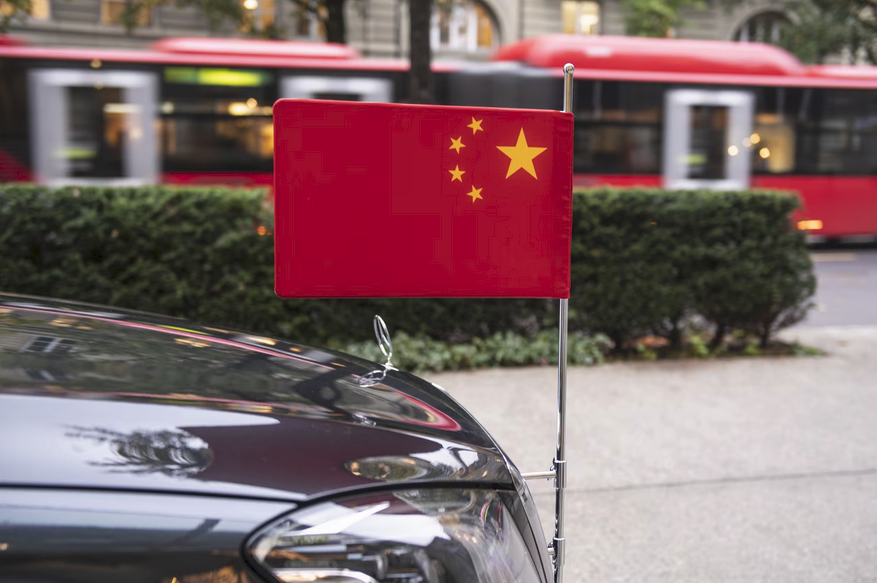Chinese Premier Li Qiang is visiting Switzerland this week. The official state visit by China’s second highest ranking official signals a renewal in Sino-Swiss ties and the kick-off of his “high-level exchange” with Europe. Here’s what you need to know about official Swiss-Chinese relations. Born in London, Simon is a multimedia journalist who has worked for www.swissinfo.ch since 2006. He speaks French, German and Spanish and focuses on science, technology and innovation issues. More from this author | English Department Share Facebook Twitter E-mail Print Copy link Why does China have an increased interest in Europe? Li, who has been tasked with reviving China’s struggling economy, is visiting Switzerland followed by Ireland, “as Beijing seeks to
Topics:
Swissinfo considers the following as important: 3) Swiss Markets and News, 3.) Swissinfo Business and Economy, Featured, newsletter, Politics
This could be interesting, too:
RIA Team writes The Importance of Emergency Funds in Retirement Planning
Nachrichten Ticker - www.finanzen.ch writes Gesetzesvorschlag in Arizona: Wird Bitcoin bald zur Staatsreserve?
Nachrichten Ticker - www.finanzen.ch writes So bewegen sich Bitcoin & Co. heute
Nachrichten Ticker - www.finanzen.ch writes Aktueller Marktbericht zu Bitcoin & Co.

Chinese Premier Li Qiang is visiting Switzerland this week. The official state visit by China’s second highest ranking official signals a renewal in Sino-Swiss ties and the kick-off of his “high-level exchange” with Europe. Here’s what you need to know about official Swiss-Chinese relations.
Why does China have an increased interest in Europe?
Li, who has been tasked with reviving China’s struggling economy, is visiting Switzerland followed by Ireland, “as Beijing seeks to highlight its openness amid concerns over its slow economic recovery”, the South China Morning Post newspaper wrote last week.
China’s economic recovery from the Covid-19 pandemic has been uneven. Total imports and exports were down in 2023, according to official trade data, amid a weakening global trade environment. Exports to the European Union and United States fell 10.2% and 13.1%, respectively. Demand for Chinese exports has been sluggish since banks in the US, Europe and Asia began raising interest rates last year to cool inflation.
Li Qiang’s Swiss visit
Li Qiang, 63, who was appointed China’s premier in March 2023, held talks with Swiss President Viola Amherd and other Swiss government ministers on January 15.
Later he will attend the World Economic Forum (WEF) annual meeting in Davos and address business and political leaders on January 16.
A Chinese foreign ministry spokesperson said Li’s visit marked the “start of the high-level exchange between China and Europe”. The two sides are expected to continue to explore “huge potential” for cooperation in trade, finance, innovation and culture.
Swiss public television SRF said the trip clearly aims to “improve and strengthen relations with Europe, particularly in economic terms. In this respect too, Switzerland is a special access to Europe and to European capital for China”. Thanks to special agreements, Chinese firms can be listed on the Swiss stock exchange and thus raise money in Europe.
Why is Switzerland a pioneer when it comes to agreements with China?
Switzerland has strong political and economic ties with China. In 1950, it was one of the first Western countries to recognise the People’s Republic of China. China has been Switzerland’s most important trading partner in Asia since 2010 and is Switzerland’s third most important trading partner after the EU and the US.
Swiss companies benefit from privileged market access in China for goods and services in accordance with the Sino-Swiss Free Trade Agreement, which has been in force for ten years. Switzerland is the only western country to have concluded a free trade agreement with China.
On January 15, China and Switzerland signed a joint declaration in Bern where they agreed to deepen their partnership. The declaration entails the finalisation of a joint study to develop the two countries’ existing free trade agreement. “This marks an important step towards the start of possible negotiations,” the Swiss government said.
The Swiss authorities say the free trade agreement is an effective instrument to enhance bilateral trade and investment. Since 2016, both sides have agreed to explore possibilities of further enhancing it. The Swiss would reportedly like to reform or update the agreement, taking into account human rights or environmental factors. Some Swiss business sectors, especially the chemical and machinery industries, are keen on expanding the deal, the Tages-Anzeiger says.
Swiss Economics Minister Guy Parmelin told SRF last week that he is “moderately optimistic” that both sides can now work on a negotiating mandate to update the accord.
But there is resistance in some Swiss political circles. An expanded agreement without a human rights clause could face a Swiss referendum launched by left-wing parties and organisations.
What’s Switzerland overall strategy towards China?
In March 2021, the Swiss government adopted its first ever China foreign policy strategy (2021-2024 period) intended to create “greater coherence” in its relations with Beijing. The strategy recognises China as an important partner for Switzerland’s foreign policy and provides a framework for the many ties between them. It also recognises clear differences in values between the two nations. The strategy set out objectives and measures in the areas of peace and human rights, prosperity, sustainability and digitalisation.
The current strategy is set to expire at the end of this year and will be replaced by a new four-year policy that the Swiss foreign ministry is currently working on. But it is uncertain whether this will involve any major changes or new doctrine.
How does Switzerland weigh up human rights and business?
The Alpine country has been holding regular bilateral human rights talks with Beijing since 1991.
Swiss-Chinese relations are a “balancing act”, Swiss Foreign Minister Ignazio Cassis admitted to the Neue Zürcher Zeitung (NZZ) in 2021. “On the one hand, we have difficult discussions with China about human rights, but on the other hand, the country is an important partner in economic and other issues,” he said.
Dialogue on human rights stalled after Switzerland supported a United Nations demand in 2018 for the closure of controversial Uyghur camps in China’s Xinjiang region. Talks only resumed in July 2023.
When he unveiled the China strategy in 2021, Cassis said Switzerland would be more critical on human rights and that this represented a policy shift. Reacting to this, China’s ambassador to Switzerland Wang Shihting strongly rejected any Swiss criticism of the human rights situation in the Asian country.
In 2022, Switzerland refused to follow the EU in imposing sanctions on some Chinese individuals and companies over alleged human rights abuses targeting the Uyghur population. The Alpine nation has also stuck to its “One China” policy, which mandates keeping diplomatic relations with only one sovereign state recognised under the name of China.
The Swiss paper Le Temps said Li’s visit to Switzerland marks a “return to high-level diplomacy” between the two countries following a four-year period that had been unsettled by the Covid-19 crisis and a certain “uneasiness with Chinese policy in Hong Kong, Xinjiang or towards Taiwan”.
Official Swiss-Chinese visits
The last official visit to Switzerland by a Chinese premier was in May 2013 when Li Keqiang, who passed away in October 2023, stopped for two days as the first European destination on a multi-country tour.
President Xi Jinping visited Bern, Geneva and Davos (for the WEF meeting) in January 2017.
In April 2019, Swiss President Ueli Maurer was received in China by Xi Jinping at the end of a week-long visit.
The next Sino-Swiss talks are expected this summer, when Ignazio Cassis and Guy Parmelin travel to China, Le Temps reported.
Edited by Mark Livingston
Tags: Featured,newsletter,Politics

